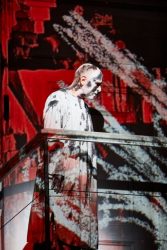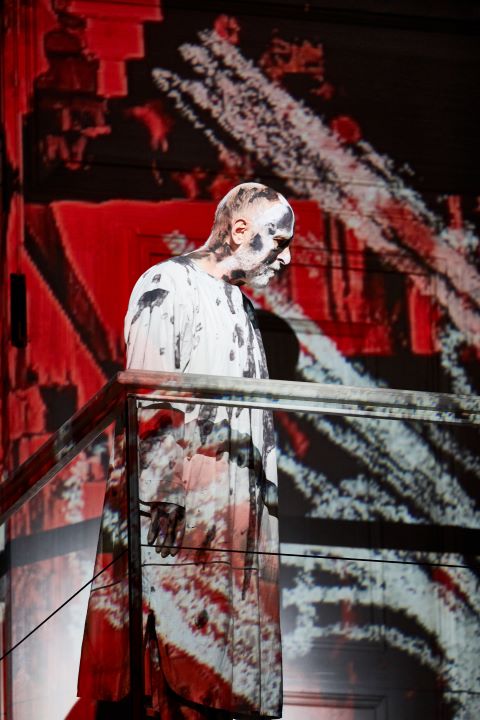 United Kingdom Mozart, Don Giovanni: Soloists, Chorus and Orchestra of the Royal Opera House, Covent Garden / Hartmut Haenchen (conductor), Royal Opera House, Covent Garden, 16.9.2019. (CC)
United Kingdom Mozart, Don Giovanni: Soloists, Chorus and Orchestra of the Royal Opera House, Covent Garden / Hartmut Haenchen (conductor), Royal Opera House, Covent Garden, 16.9.2019. (CC)

(c) Mark Douet
Production:
Director – Kasper Holten
Revival director – Jack Furness
Designer – Es Devlin
Costumes – Anja Vang Kragh
Lighting – Bruno Poet
Choreography – Signe Fabricius
Revival Choreography – Anne-Marie Sullivan
Video designer – Luke Halls
Cast:
Don Giovanni – Erwin Schrott
Leporello – Roberto Tagliavini
Donna Anna – Malin Byström
Don Ottavio – Daniele Behle
Donna Elvira – Myrtò Papatanasiu
Il Commendatore – Brindley Sherratt
Zerlina – Louise Alder
Masetto – Leon Košavić
Donna Elvira’s Maid – Josephine Arden
There is no such thing as coincidences, I am (somewhat) reliably assured, so perhaps after Emily Howard’s Antisphere at the Barbican (review click here) – a geometric concept related to the work of Escher – I renewed acquaintance with Kasper Holten’s similarly Escher-inspired Don Giovanni. His experiments with perspective are trying to tell us something; to look at ourselves and situations from a different angle perhaps …
The problem with visual trickery in opera is that the more one experiences it, the less the effect; a position that certainly does not apply to the music itself. So it is that the discombobulatory video circlings during the ‘Champagne aria’ – with the Don right in the middle – are now more of a queasy moment than an eyebrow-raising one. It must be nice for opera newbies to have the name of the character written on the wall when they appear though …
In some earlier performances, Don Giovanni sang along with abandon to the Cosa Rara wind Harmoniemusik quote; more startlingly, in some previous incarnations of this production, the opera finished after the Don’s decent into Hades, with no moralising afterward. Here, though, we had the final sextet, ‘Questo è il fin’, sung offstage, which had not been present in each of the two incarnations I had experienced previously (2015 in non-reviewing form, with Christopher Maltman as the Don, and 2018, which I reported on (click here); although it is there on the 2014 DVD. To hear it here came as something of a shock; presumably Holten – or Jack Furness, the production’s revival director – sees it as optional and to be experimented with?
The modernity of the staging might previously (2018) have been complemented by the informed conducting of Marc Minkowski, but Hartmut Haenchen’s take, despite his associations with, particularly, the music of C. P. E. Bach, was leaden, a throwback to the 1970s. The stolid tempi might have passed muster then, but nearly 50 years later one wondered, simply, why. The dramatic trajectory sagged at numerous points, and there were some moments of faulty ensemble that seemed inexplicable, even taking first night nerves into account (the opening of the second act was a particularly messy spot).
On to the singers and my, has Donna Anna had a good ride in the history of this production (decide amongst yourselves whether there’s a pun there or not). Previous incumbents include Albina Shagimuratova (2015) and the excellent American soprano Rachel Willis-Sørensen in 2018. Here, it was the singer who graced the stage in 2014, Malin Byström in fabulous form, nuanced but strong.
Originally, we were to have had Christine Rice as Donna Elvira this time round. She withdrew due to personal reasons, and Greek soprano Myrtò Papatanasiu stepped in for what was a creditable Royal Opera debut (she has sung the role before at Barcelona’s Liceu), the fury of her ‘Ah, fuggi il traditor’ believable, although eclipsed by her predecessor in 2018, the Armenian soprano Hrachuhi Bassenz. Donna Anna’s fiancé, Don Ottavio, was cleanly, appealingly sung by Daniele Behle.
Louise Alder was a splendid Zerlina, fresh and delivering a lovely ‘Batti, batti’, if not eclipsing memories of Julia Lezhneva in 2015; her Masetto, the Croatian baritone Leon Košavić, provided a fine assumption of the role.
Erwin Schrott as the Don exuded confidence and stage presence. He is absolutely believable as the arch-seducer, and vocally he is at the top of his game. Haenchen’s speeds at least ensured nothing had to be gabbled (the ‘Champagne Aria’ a case in point). Perhaps this time round one realised the Don’s manipulation was applicable everywhere: the decidedly abusive aspect of his connection to his partner-in-crime, Leporello, was writ large. His pronounced shooing away of spectres at the close was also notable (could it be deliberate that this echoed the ‘plucking’ and shooing gestures one sometimes sees in patients at the end of a long illness as death appears?; Don Giovanni does it, after all, immediately before his demise). Leporello was Roberto Tagliavini, who after Ildebrando D’Arcangelo last year had a lot to live up to. Tagliavini’s ‘Catalogue Aria’ was excellent, if not quite as captivating as his immediate predecessor’s.
A real treat to see and hear Brindley Sherratt as Donna Anna’s father, the Commendatore. Commanding the stage at very entrance and in fine voice, his towering over Don Giovanni in the opera’s final stretches was intensely memorable.
If the orchestra sounded, perhaps understandably, less than fully engaged, there were some superb continuo contributions, from (particularly) harpsichordist Susanna Standers and cellist Morwenna Del Mar. A combination of circumstances, though, meant that this Don Giovanni feels rather tired.
Colin Clarke
For more about what is on at the Royal Opera House click here.
